#Toulon asks
Explore tagged Tumblr posts
Text
Pussyman help 😭 😭-


69 notes
·
View notes
Text




Letter from Thomas Jefferson to John Jay
Record Group 360: Records of the Continental and Confederation Congresses and the Constitutional ConventionSeries: Papers of the Continental CongressFile Unit: Letters from Thomas Jefferson
Paris July 19 1789.
Dear Sir
I am become very uneasy lest you should have adopted some channel for the conveiance of you letters to me which is unfaithful. I have none from you of later date than Nov. 25. 1788. and of consequence no acknolegement of the receipt of any of mine since that of Aug. 11. 1788. since that period I have written to you of the following dates 1788. Aug. 20 Sep. 3. 5. 24. Nov. 14. 19. 29. 1789. Jan. 11. 14. 21. Feb 4. Mar. 1. 12. 14. 15. May. 9.11.12 Jun 17.24.29. I know through another person that you have received mine of Nov. 29. that you have written an answer; but I have never received the answer, and it is this which suggests to me the fear of some general source of miscarriage.
The capture of three French merchant ships by the Algennes under different pretexts has produced great sensation in the seaports of this country, and some of it's government. They have ordered some frigates to be armed at Toulon to punish them. There is a possibility that this circumstance, if not too soon set to rights by the Algennes, may furnish occasion to the States general. Then they shall have leisure to attend to matters of this kind to disavow any future tributary treaty with them. These pyrates respect still less their treaty with Spain, and treat the Spaniards with an insolence greater than usual before the treaty.
The scarcity of bread begins to lessen in the Southern parts of France where the harvest is commenced. Here it is still threatening because because we have yet two or three weeks to the beginning of harvest and I think there has not been three days provision beforehand in Paris for two or three weeks past. Monsieur de Mirabeau, who is very hostile to Mr Necker wished to find a ground for censuring him in a proposition to have a great quantity of flour furnished from the United States which he supposed me to have made to Mr. Necker, & to have been refused by him; and he asked time of the states general to furnish proofs.The Marquis de la Fayette immediately gave me notice of this matter and I wrote him a letter to disavow having ever made any such proposition to Mr Necker, which I desired him to communicate to the states. I waited immediately on Mr. Necker and Monsieur de Montmorn, satisfied them that what had been suggested was absolutely without foundation from me, and indeed they had not needed this testimony. I gave them copies of my letter to the Marquis de la Fayette, which was afterwards printed. The Marquis, on the receipt of my letter, shewed it to Mirabeau, who turned then to a paper from which he had drawn his information. I found he had totally mistaken it. He promised immediately that he would himself declare his error to the States general and read to them my letter, which he did. I state this matter to you, tho' of little consequence in itself, because it might go to you mistated in in the English papers-our supplies to the Altantic ports of France during the months of March, April, & May were only quintals 12,220 - 33 of flour and quintals 44,115 - 40 of wheat, in 21 vessels.
81 notes
·
View notes
Text
Magnus "it followed me home" Bane
Ragnor: "I said no pets as long as we have to live together."
Magnus: "Look Ragnor, me having catnip in my pocket and making psspsspss sounds while walking, does not mean I brought a cat home. It followed me. You said while we live together, I'm not allowed to bring in pets. You didn't say anything about strays following me and deciding they would like to stay."
-
Catharina: "The Alpha from the Toulon werewolf clan asked me to give this to you." hands over a Father's Day card
Magnus: "Sentimental pup. Did I ever tell you how I met her?"
Catharina, eying stack of similar cards on the living room table: "I can't recall. But I have a feeling it's a familiar story."
Magnus, eyeing Catharina eyeing his cards: "… They all followed me home."
-
Dot, surprising Magnus with a visit, only to find a bunch of shadowhutners in his apartment.
Magnus: "-"
Dot, holding up a hand to stop him from explaining: "Let me guess, they followed you home."
#magnus bane#shadowhunters tv#malec#crack#ragnor fell#catarina loss#dot (shadowhunters)#it's not Magnus' fault when animals and people follow him home; okay?#also I just love the thought of a more prominently featured 'downworlder Dad!Magnus'#I want all the downworlder Dad!Magnus content#let it be known that there is not a loophole in existence that Magnus hasn't tried to exploit#Ragnor should have worded his “no pets” rule better.
78 notes
·
View notes
Text
Little Yellow Emperor: the Life of Napoleon in LEGO
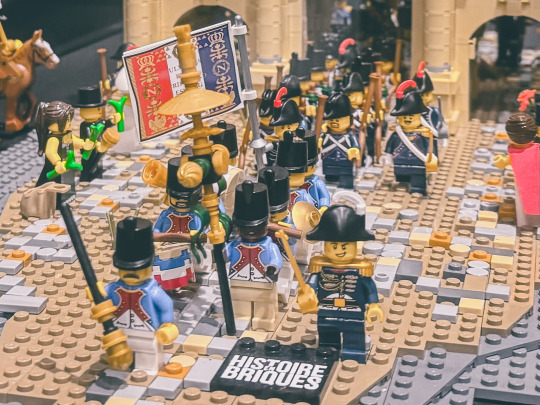
The Battle of Waterloo Domain is hosting a LEGO exhibit called "THE LEGEND OF NAPOLEON IN LEGO BRICKS." As a recovering LEGO addict and an eternal fan of 18th/19th-century French history, I simply had to go. After successfully bribing the husband with beer and fries and the children with waffles, we made the trip today.
The exhibition was smaller than I expected, but some of the builds were genuinely impressive. It traces Napoleon's life from his birth in Corsica to his death on Saint Helena—a neat, bite-sized way to introduce his story, and a fun way of recreating history. However, one thing that did bug me a bit: while the audio guide is available in multiple languages, all the wall texts are in French. In a trilingual country, especially at such a touristy site, that feels like a bit of a miss (plus, it gave the Dutch-speaking husband an excuse to grumble).
Gripes aside (1), the exhibit was a lot of fun. Here are my favourite builds.
1. The Campaign in Egypt


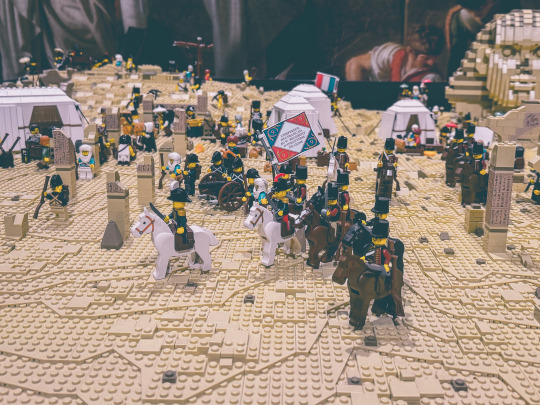

This recreation of Napoleon’s Egyptian campaign is absolutely brilliant. The photos don’t do it justice—every detail, from the Sphinx to the busy French camp, is spot on. It's also huge and apparently took close to 70 hours to build! @chickenmadam can you spot Kléber?
2. Napoleon's Coronation as Emperor
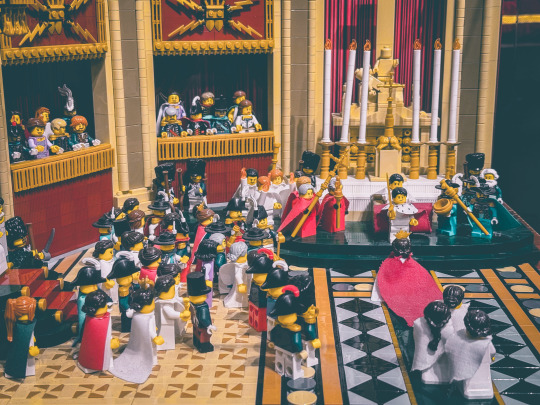
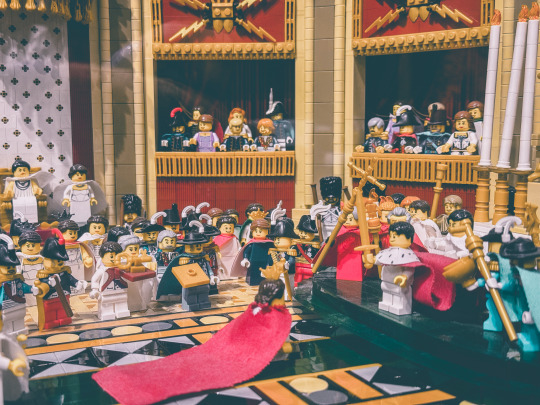
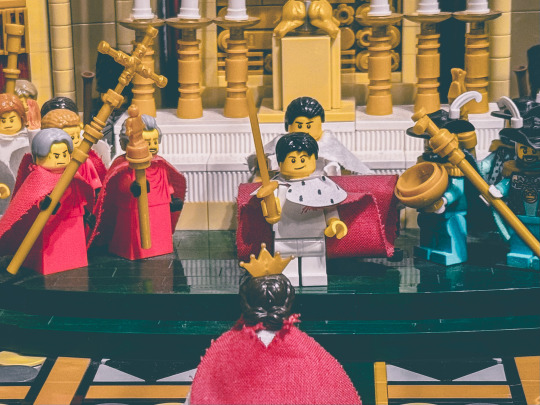
The second build, depicting Napoleon's coronation, may be smaller, but it's full of impressive details. I especially loved the grumpy expression on Pope Pius VII’s face, along with the equally unimpressed looks from the rest of the clergy—it really adds character to the scene!
3. The Coup on 18th Brumaire
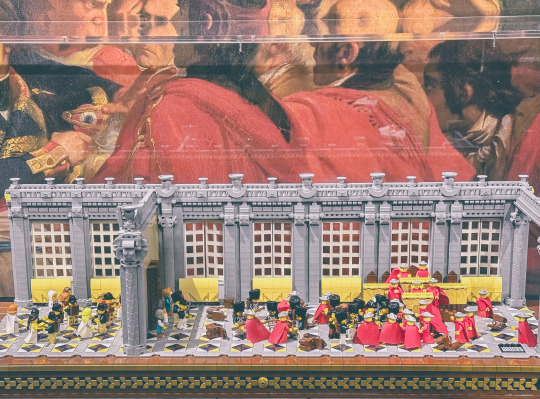
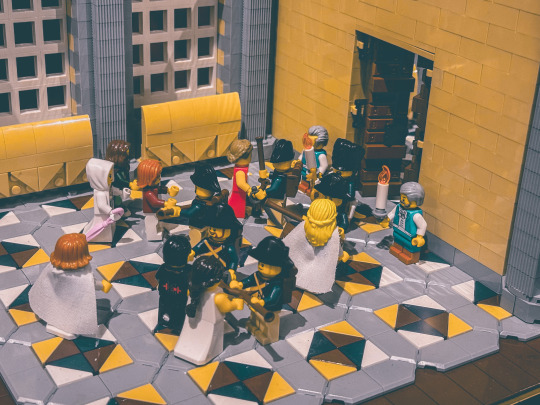
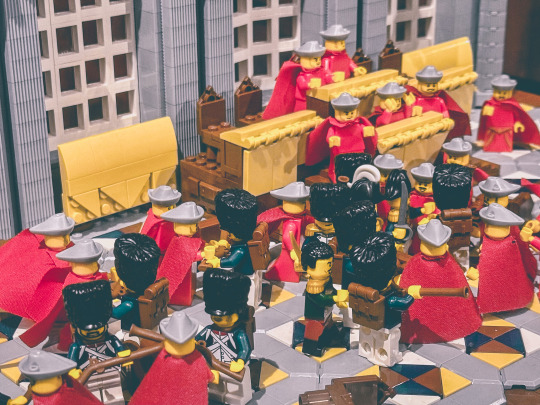
Again not a very big build but... those red capes... the hats... the outfits —need I say more?
4. Napoleon asks Josephine for a Divorce
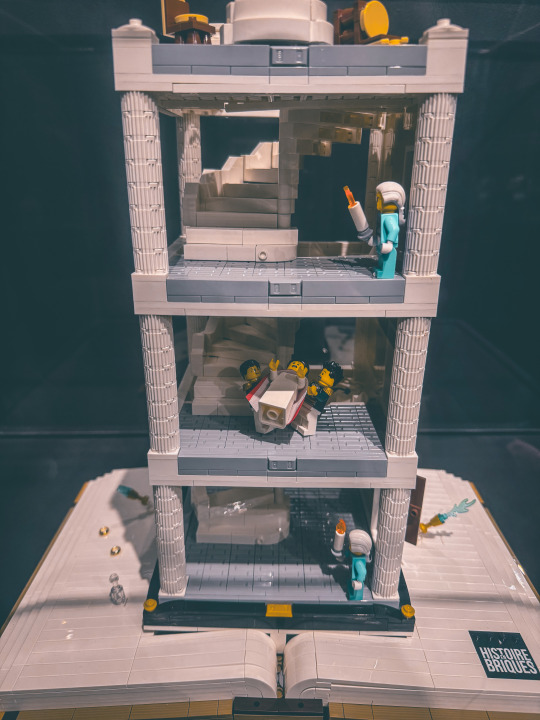
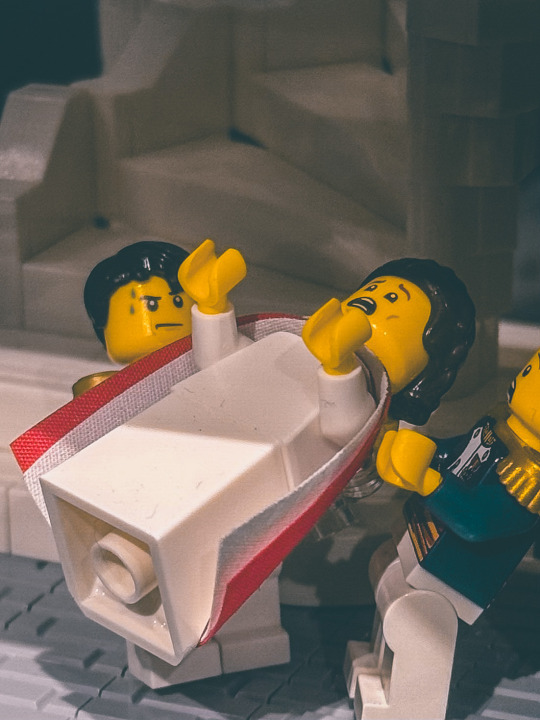
This moment is supposed to be, by all accounts, heart-wrenching for everyone involved—Napoleon asking Josephine for a divorce. But, since it’s LEGO, it ends up looking unintentionally hilarious.
5. The Crossing of the Berezina River
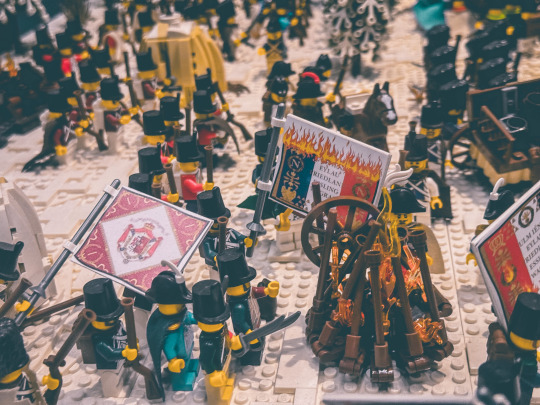
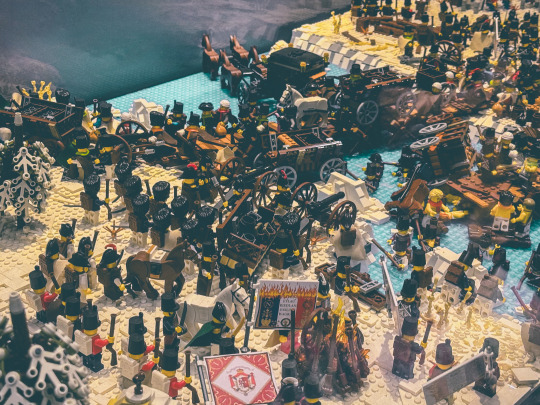
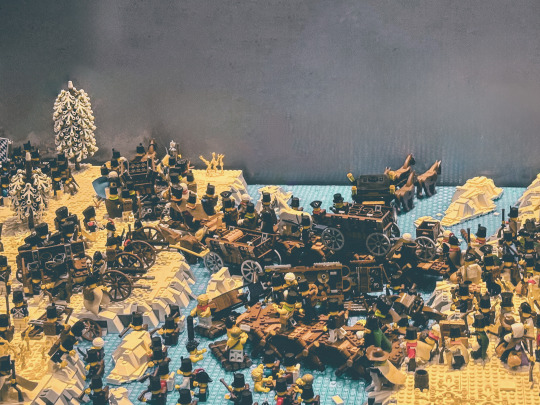
This is another brilliant build, capturing what was arguably Napoleon's greatest military disaster. While it's not as large as the Egypt campaign scene, it’s packed with intricate details that make it just as interesting.
6. Napoleon's Civil Code
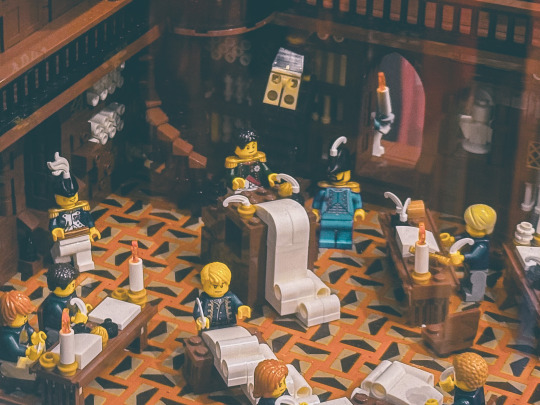

Yes. He has a GIANT parchment.
7. Daddy Napoleon and his son
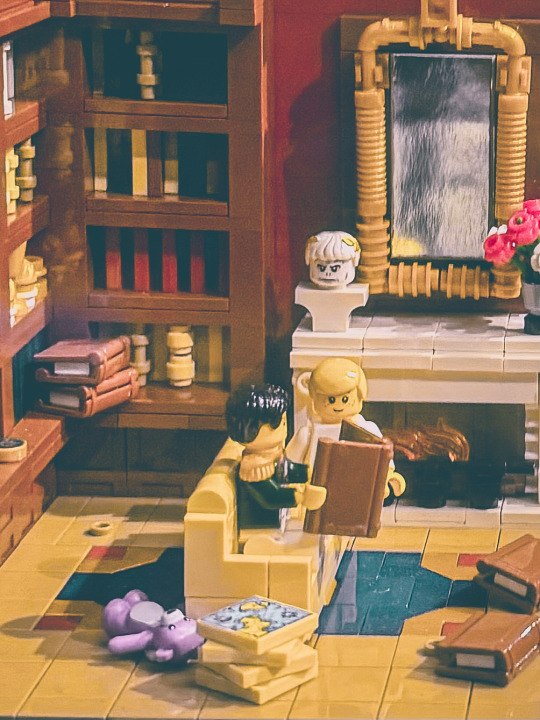
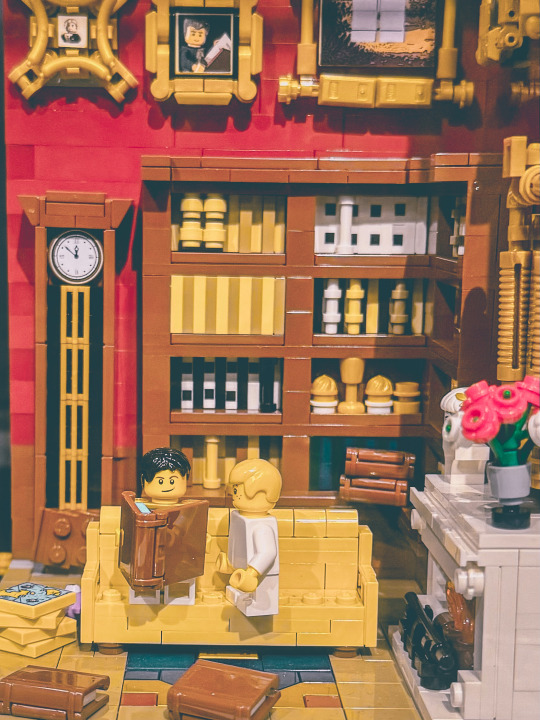
Because the King of Rome has a purple teddybear and a grumpy statue of his dad in his room...
Bonus: The Battle of the Arcole Bridge
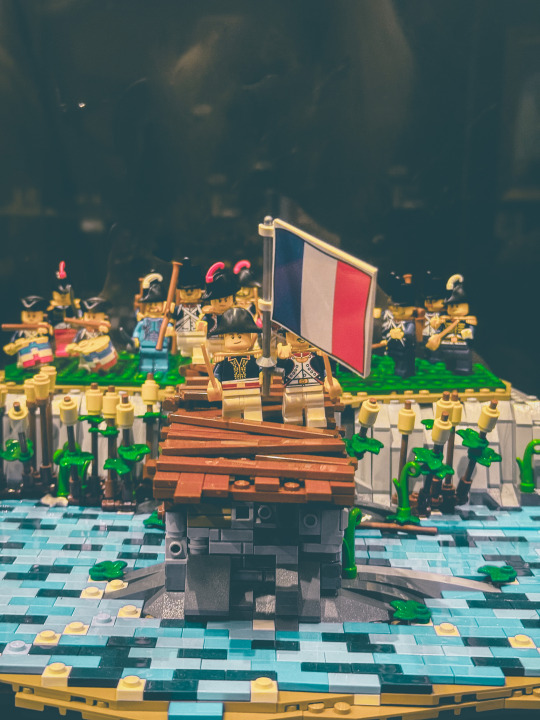
Not particularly impressive per see as a build, but this is one of my favourite moments in Napoleon's story, so... why not?
Notes
(1) Yes, they recreated the siege of Toulon. No, Bonbon isn't in it. That makes me sad.
#frev#napoleonic era#napoleon bonaparte#napoleon#history#lego#napoleon ii#french revolution#amateurvoltaire’s travel diary
48 notes
·
View notes
Note
Don't tell my friend that I did not sleep immediately (she will scold me XD). But what is Napoleon and Junot about? Gib their interactions, their history, the tension, their secrets, what you thought about them, what is good and bad about them, headcanons, some things that you love about them, anything that will save my curiosity before I go to sleep in 4:30 am 👀
That is all. Have a nice day/evening 😌
HELLO!! sorry for my late reply I have the cold and I was figuring how to write this without sounding too crazy 😭😭 thank you @whatever-whatsoever for reminding me to check my inbox 🤩 YESSS NAPJUNO ASK!!!! THANK YOU ❤️❤️ I'll have to give a super abbreviated version because they had so much history *sniff* 🥺
I may yap more about my personal head canons and why I love them in a separate post hehehe👅
disclaimer: I don't claim to be objective or an historian as this is very napjuno-biased :P English is not my first language so there will be many grammatical mistakes😭
I feel like I should first mention that Napoleon and Junot had a long history of correspondence throughout their lifetime. And Junot kept every. single. letter Napoleon wrote to him. Unfortunately none of these letters exist anymore because Napoleon sent a lackey to have them burned the moment Junot committed suicide. (I WILL NEVER FORGIVE NAPS FOR THIS 😭) so most of what we know about their relationship is secondhand from Junot's wife, Laure Junot's (Duchesse d'Abrantes) memoirs. She's also not the most reliable person so it's possible she might heavily exaggerated on some stuff
As for the letters, it's always been up for debate why Napoleon wanted them gone but my personal headcanon is they must've been written in a very romantic tone... and Napoleon was so heavily trying to suppress his feelings for Junot and burning those letters was a way of burying their relationship once and for all
OKAY, SO A BRIEF HISTORY ON NAPJUNO!!
Junot's fated meeting with Napoleon began in 1793! He was already promoted to a segreant when they met and Napoleon was already a General at the age of 24(!). It was during the Siege of Toulon that Naps had asked for someone who had beautiful handwriting to dictate a letter and Junot volunteered to write what he dictated before a cannon fire sprayed it with dirt. Naps was so impressed by his coolness that he made Junot his secretary and Aide-de-camp, and soon they'd become inseparable
soon after Toulon, Napoleon was accused of treason for his connections to Augustin Robespierre and was jailed. Junot , of course freaking out about this wrote him letter to offer an escape but Naps declined.
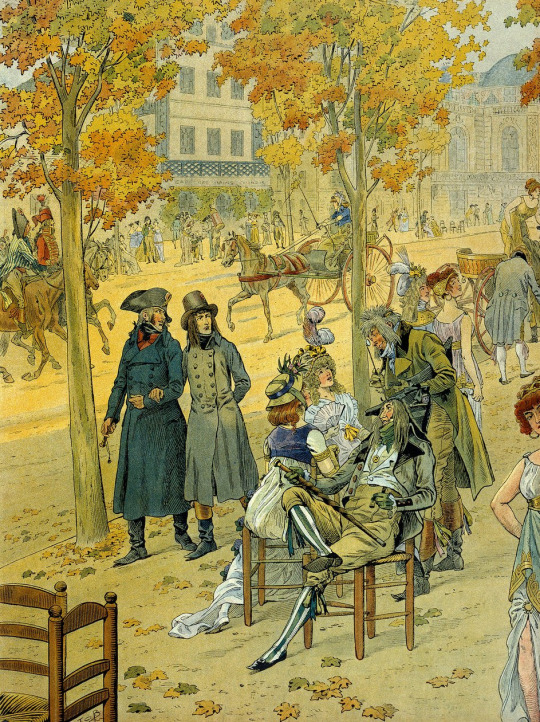
^ this illustration by Jacques Onfoy de Bréville represents one of their "leisure moments" together circa 1794-95
so after a little while Napoleon got married and found his fortune, Junot continued to follow him to his legendary Italian and Egyptian campaigns. In Egypt, he was promoted to General but he was actually not too happy with this since this means he'll be away from Napoleon often. There's also this famous (or infamous?) incident where he challenged General Lanusse to a duel ,simply because he opposed Napoleon's leadership , with this words :
«We must fight; it is essential that only one of us survive. I hate you because you hate the man that I love and admire as much as God, if not more»
sounds like a chivalric romance doesn't it? :3 It was also during this campaign there were rumours within the army comparing Naps and Junot to "Hadrian and Antinous" . of course Junot does nothing to dispel those rumours 🤓 Poor guy got wounded in the stomach and Naps didn't visit him until the last minute.
Napoleon wasn't able to take Junot with him when he left Egypt and by the time Junot made it back to France in 1800, Napoleon was already First Consul and the power differences between them already put a strain on their relationship. This was further exacerbated once Naps became Emperor.
When Naps sent Junot to Portugal , he wrote a bunch of desperate letters begging him to reappoint him as his aide-de-camp again and Napoleon once confronted to Junot's wife about the letters he wrote to him (I'm like 99% sure it probably sounded more romantic than the ones he wrote to her) . it got to the point that Laure Junot ahd to admit that Junot possibly loved Napoleon more than her and their children.
Junot was often sent away from Napoleon during from like c. 1806-1810ish? and didn't interact much except by correspondence (I think) I'm going to skip over the Portugal /Spain period
Okay so by the Russian Campaign of 1812, Junot pretty much fell out of favour from Naps and the consequences of Junot's actions almost completely destroyed their relationship. By this time period, Junot's mental and physical health was very, very fragile from his campaigns in Portugal & Spain and Napoleon was no longer the Napoleon he knew back in their youth. Napoleon was furious and even shamed him on the military bulletin. Junot was devastated at this and the thought of losing Napoleon's friendship was unbearable after 20 years of being devoted to him.
After he returned to France from Russia, there are several anecdotes mentioning how he would wanderlessly mutter out loud that “The Emperor no longer loves me” in his apartments😭 Napoleon's love for him was all that mattered😭😭💔
There's this scene where Duroc (Napoleon's Grand Marshal of the Palace) and another friend visited Junot to comfort him and this happened:
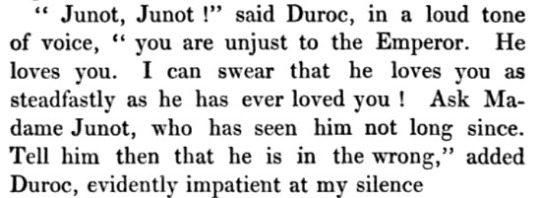
Junot obviously didn't believe the Emperor still loved him of course💔

Soon after spending some time resting and with his family, he was appointed Governor of Illyria. (I think Naps sent him there because he wanted him out of France but Idk). His insanity finally set in and there's this infamous incident where Junot attended the ball completely naked except for his medals and hat and his battle wounds were on full display...
Soon after that, he had to be forcefully be sent back to his father's home in Montbard. It was there where he committed suicide by jumping out the window.
💔
Junot's last letter to Napoleon is heartbreaking by the way....
“I who love you with the affection of a savage for the sun, I who am entirely yours. Well then: This eternal war that we must fight for you, I WANT NO MORE OF IT! I WANT PEACE! I want finally to repose my tired head, my sore limbs … to enjoy that which I earned … with my BLOOD! The blood of an honest man, of a good Frenchman, of a true patriot. I therefore ask, at last, for that tranquility that I earned through twenty-two years of effective service and seventeen wounds from which my blood has flowed for my country, and for your glory.
Like I mentioned in the beginning, soon after the news of Junot's demise reached the public, Napoleon immediately sent someone to his house in Paris where his wife and brother-in-law were at and forcibly searched through Junot’s home to seize and burn his letters.
Oh yeah there's more but I'll leave it at that for now </3 LIKE WHAT THE HELL NAPS WHY DID YOU BURN THE LETTERS 😭😭Like they must've been fucking crazy man,,, omg sorry this keeps me up at night 😭
they make me so

Junot's ending was sooo tragic.... he was definitely a Greek tragedy-esque figure😢 He possibly died believing Napoleon hated him when that wasn't the case. Napoleon, despite reprimanding Junot very harshly for Junot's actions (non-actions?) during the Russian campaign, he still had a soft spot for him.
I also think of like how his life would've been better without meeting Napoleon. But also thinking again how much Junot treasured his meeting with Napoleon.... ough they're so painful sdkjskdljdhljhdjfhdkjhfdj excuse me while I combust
NapJuno was basically like painful unrequited love slow burn over 2 decades . Or maybe it wasn't completely unrequited? I like to think Napoleon was in denial and constantly tried to suppress his feelings for Junot 😔😔😔 anyway Junot was so delulu... (he's my precious delulu cat) he kept hoping Napoleon would still love him like he used too pre-Emperor days. Of course those days will never come back. I guess he was always living in the past while Naps moved on 🥲💔
well even if Napoleon doesn't love him at least I do 😤
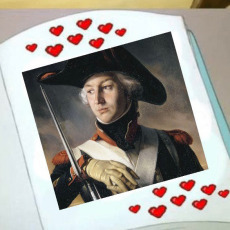
as my friend @ promises-of-paradise once said, I think Junot was almost definitely romantically obsessed with Napoleon. Like actual romantic love (I'm not even being delusional this is what I truly believe). Whether they actually did anything together is up for debate, but it’s clear that Junot’s feelings for Naps were a lot more intense than a regular friendship.
also I highly recommend reading these posts regarding Junot and NapJuno's relationship:
The NapJuno bible of course: https://erenow.org/modern/napoleonic-friendship-military-fraternity-intimacy-and-sexuality/4.php
BTW THERE'S A NAPJUNO RPF WRITTEN AND PUBLISHED IN A FRENCH MAGAZINE BACK IN 1926!!!! I JUST NEED TO FIND THE LINK (it's also in French)
and Laure Junot's memoirs! it's available on the internet and she (and imo rightfully) suggests Napoleon and Junot were possibly incredibly intimate during their broke days. Girl was the OG napjuno shipper istg
~~
If any of my fellow NapJuno fanatics want to add info about them more please do so!!! I'm probably forgetting some stuff 😭
44 notes
·
View notes
Text
Napoleon, The Director’s Cut
The added material makes the film better but that doesn’t mean it’s good.
So I did it. I rewatched the Napoleon movie with the added material. I was wondering if a second view would salvage it, maybe it ages well.
That answer is no.
It has been awhile since I saw the theater version, so I am not 100% sure that what I will say isn’t maybe a few scenes that were in the movie and I just don’t recall. There are new scenes and old scenes that are longer now.
From the beginning to Toulon are about the same as far as I can tell. One thing I will note: it is curious that they chose as the Bonaparte family representative Lucien. I am happy to see Lucien get some love as he’s my favorite of the dysfunctional clan, but it seems a weird choice. Joseph is usually chosen because he and Napoleon do have a different dynamic of an elder brother who has such a stronger personality younger brother. But what is equally weird is that Lucien serves no purpose. He’s there in a military looking uniform listening to Barras talk about France’s military challenges, he just pops up in Toulon (as does Barras who apparently just hangs around on the perimeter of the battlefield) so Napoleon can hand him the cannonball he fishes out of his poor dead horse (I’m traumatized all over again), and then disappears completely after the coup d’etat.
There might be some new stuff in here but I am not remembering it.
The most backfill is the Josephine arc, and that does actually help the film somewhat. In the theater version Josephine launches on screen stumbling out of prison.
Scene one shows her at her home and some asshole guy is questioning a five year old Hortense about the whereabouts of her father and the Revolution. Eugene stands back with Lucille, the maid. Josephine watches the scene from the top of the stairs wrapped in a shawl. Little Hortense is obviously scared and says that her father is in prison and the Revolution is against the nobility. The man asks her about her and the father (I think) loyalty and is she a noble, and she looks to Josephine for guidance, Josephine nods at her to answer. She says she is noble, her father does support the Revolution, and so does she. The man warns her not to lie because he can tell. Josephine pipes in saying that she’s a five year old child leave her alone she tells the truth etc.
That scene bleeds to the next where Josephine is in the back of a cart of other prisoners and is being unloaded at Carmes prison. She is processed through by a gruff woman who strips her of her rings and demands to see in her mouth. She wanders around the prison and at all the chaos. A woman comes out and calls her name and they embrace. It’s Therese Tallien. She leads her through the prison and acts a bit of a tour guide. The watch some prisoners get in the cart to meet the guillotine. Therese says there is no tears….moving on. They pass cramped quarters where they pass a couple having sex. Therese says if a woman gets pregnant she can avoid the blade and “since when do men need a reason to fuck?”
The next scene is that night and Josephine lays in Therese’s bed and watches her doll herself in the mirror as much as she can. She ties a red ribbon around her neck and tells her how it represents the blade. Therese states she will survive this and Josephine can too or she can die pure. Josephine stays silent in all these scenes.
Next scene is Josephine cutting her hair short, looking a little more sexy in her dress and walking down to the lower part of the prison where she goes to a man waiting for her on a bed. And fade to black.
There is a rather powerful scene of an order of nuns being led to the guillotine. The crowd jeers and screams at them just like they did for Marie Antoinette. But these nuns look pristine in their habits and they go to their deaths calm and cool and singing a hymn in French. The last nun is just a young girl and she watches as all her order meets their end and she goes up the platform and they rip her veil from her and put her down on the bench for the blade and she never misses a note. Her song only ends when the blade falls. The crowd that was bloodthirsty just goes deathly silent and exchange looks with each other.
That follows the scene of Barras confronting Robespierre over his actions. Same as the theater version. Robespierre shoots himself again but the scene doesn’t end with Barras saying “the guillotine for you my friend” the added scene is Robespierre’s death as he is dragged with his bandaged face up to the guillotine with the crowd cheering. He is beheaded.
The scene with Josephine leaving prison is longer. She walks around the city and it’s rather strangely deserted and messy streets. She comes to her house and enters to find it’s been ransacked. She goes up the stairs calling out to her children and Lucille. She is eventually confronted by Lucille who takes her to be an intruder but then recognizes her and calls for her children. They appear and approach her slowly as Josephine takes off her hood and they all reunite.
The party scene where Napoleon and Josephine meet is longer. Napoleon runs into Barras who cheers him but Napoleon like the buzzkill he is refuses to show a smile and Barras eye rolls him off. The scene of the play that they are putting on is a bit longer with Josephine and Napoleon first noticing each other in this setting and exchanging glances. Josephine is sitting at Barras’ table. Napoleon is hanging out with Lucien.
An added scene is that after the party there is a scene of a naked Josephine having sex with Barras after the party. She watches herself in the mirror. Barras tells her she accumulated a lot of debt at the party that night and gets up to get some money for her debts. She quips she should charge him more for the attention she brings him. He tosses the money at her and says he will pay for her debts this time but he’s done. She needs to get to know Bonaparte.
Fast forward to Napoleon and Josephine courting. Lucille and Josephine talk about whether Josephine likes Napoleon that way or not. There is an extended scene of Napoleon receiving her invite but this time it shows him standing outside her door killing time in the street by reading a newspaper. Lucile watches him from the door discreetly. She closes the door when he come across the street. He rings the bell and Lucille stands inside the door smiling. She makes him knock again before she opens and smiles and welcomes him in. I am not sure what this is supposed to be implying? Lucille has a crush on him too?
The wiff of grapeshot is the same but there is an added scene of Napoleon, Barras and other random military men singing a song and toasting their success. They all congratulate Napoleon as the savior but he shrugs it off and plays humble.
The wedding scene is slightly longer I think. The guy talks about their birthdays that I don’t remember from the original.
Italian campaign is merely what they show in the released footage that I posted. There is the dinner where Napoleon notices Hippolyte and Josephine chatting it up at the dinner table.
There are more scenes with Hippolyte and Josephine. Mostly narrated by Napoleon writing to her his love etc. One scene of Josephine buying hats and Hippolyte sits in a chair and watches her. She looks sad like she does through most of this film. Hippolyte puts on a turban and clowns around. The two maids find it adorable and laugh. Josephine seems mortified and keeps telling him to stop and to take it off.
There is an extra scene of Napoleon and Josephine lying in bed and she tells him that the trouble is that he is always off to battle and she is alone and never knows if he will return or not. He assures her he will always return and not to worry. He kisses her all over her face and she looks on gloomy. I don’t remember where this scene is, but it’s around the Italian campaign scenes.
Another Josephine and Hippolyte scene where he is in her garden chatting up people and Josephine sits inside by the piano listening to the musician play. He watches her as she looks visibly upset.
Napoleon in Egypt is pretty much the same as the original. His return is slightly different. He returns to find the house empty and blows up at Lucille. There is an added creepy scene of Napoleon eating alone at the dining table and Lucille comes in with a plate. Napoleon stops her and apologizes for his outburst. She understands. Be great if they stop there. But no. Napoleon slides his chair out and asks Lucille to sit on his knee and she does. He tells her he’s sad and needs comforting what can be done? She tells him she can get him some desert or draw him a hot bath and she will console him. Napoleon just lays his head on her shoulder.
The scene where Napoleon confronts Josephine over the affair is for the most part the same except there does seem to be some added dialogue. Josephine the following day asks Napoleon if had affairs and he admits he did. She asks if they were pretty and did he love them etc. He says they were pretty because they didn’t cry. She then says she doesn’t care as long as he doesn’t leave her. Please don’t leave me. I don’t recall this in the original film but maybe it was there and I just blocked it out.
The scene where Napoleon confronts the directory is longer to me it seems with some additional dialogue but that could be wrong.
There is an additional scene of Napoleon cleaning his guns at the dinner table with Lucien. They are a bit drunk and Lucien says he doesn’t get why Napoleon is going along with the plotters plans. He doesn’t need them. Napoleon says he will need ladies in waiting, right? Lucien says they aren’t good except to lick your balls and Napoleon laughs and says that he will need one of those. Josephine stands on the balcony watching and listening. She leaves, Napoleon hears the sound and swings the gun in her direction but she’s gone.
There is a new scene I think of Napoleon designing the Consulate uniforms. There is also a scene of Napoleon and Josephine hosting a party and mingling along the table where Napoleon kinda flirts and Josephine watches him and the flirts with whoever she talks to.
The assassination attempt scene is pretty much what has been released. It happens incorrectly and Napoleon yells at his advisors. They do show the execution of the Duc d’Enghein out in the forest and not in a moat. He’s some poor sweaty looking guy. He messes with the gravel he’s standing on and turns and there is the firing squad. He reminds them he is a Frenchman and some other nobles stuff and asks to command the execution. The guy who I assume is General Dumas ignores him and commands ready…aim…but then tells the duc that he can go ahead. The duc instructs to aim at the heart and the guns fire.
It’s the scene right after the coronation that Napoleon and Hippolyte Charles have their conversation.
A lot that comes after this is the same I think. There is a whole scene in Russian between the Czar and God knows who. And they only subtitle half of the scene. So you listen to the rest and don’t know what the fuck anyone is saying.
There is a scene of Napoleon huge ass map being painted by David. Napoleon wanders in in his nightgown and starts walking on the map. David tells him it’s not dry and if he must walk on it, he can step on Italy. Cut to the new scene of Napoleon and his generals on the map planning Austerlitz and Napoleon hopping on Italy so as not to disturb the now dry paint? I don’t know.
There is a scene of Napoleon on the toilet before battle, I believe it’s Austerlitz. He gets up and then buries his head in a bowl of water. He strips down and asks I guess the valet to brush him like a horse. Harder etc.
The next new scenes seem to be Napoleon on Elba. There is a scene of him walking down a street by himself and he draws his sword and starts practicing fencing moves but trips over his own feet and falls down in a doorway.
There is a scene of a boy bringing his boots that he shined in and dropping them unceremoniously on the floor. Napoleon chuckles and asks him to go get him wine. Napoleon sees in the paper Josephine is wining and dining Alexander. He gets mad but this time the boy enters the room and Napoleon asks him if he knows who Alexander is. The boy says no. He asks but you knew who I was? The boy says yes. Napoleon dismisses him.
There is a new scene of Napoleon and his mother serving him lunch. She quips she didn’t come all this way to sit and have lunch with her son who is a moody SOB. Napoleon doesn’t react but just broods. She tells him he wasn’t meant to die on this island and puts her arm around him. Napoleon tells her his wife is entertaining the Emperor of Russia in his home. Madame Mere hugs him.
Except she isn’t your wife. It isn’t your home. And she’s dead. And what has happened to his son and Marie Louise? Never mentioned again.
The scene where he learns of Josephine’s death seems longer. There is a scene where he goes into her bedroom and crawls into bed. That might be in the original and I forgot.
There is a small scene of him on the toilet again before Waterloo. He wipes his tush and look into the bowl to see nothing but blood.
There is an additional added on scene of Napoleon showing the St. Helena girls how to fence before he just drops dead at the picnic table.
I think those are all the added scenes. I may have missed a few.
This movie feels like a bunch of baggage the British have yet to unload from Napoleon to me. Like an angry ex who can’t understand why the guy they broke up with is still so popular and why we aren’t writing odes to Wellington. It also feels strangely like English cartoon propaganda come to life. Like all those English cartoons now filmed with people.
I say this because the obnoxious hit you over the head stats at the end tallying up the war dead is just so cringing. I am no war lover but laying the blame at Napoleon only seems the worst of takes. Not only does it ignore that a lot of history is people waging war and killing each other, it’s not as if Napoleon is a serial killer racking up all these deaths on his own. If Napoleon is to blame, then so is Wellington for dragging his army out at Waterloo. He could have stayed away and look how many people would have lived? And a nation that was at one time killing people left and right all over the globe as it expanded empire saying “yeah but Napoleon did…” seems a bit too hypocritical.
Second, if Napoleon is such a baddie, then why portray him as such a buffoon? It’s hard to hate him in this movie because he’s a cartoon. This Napoleon if anything makes me want to flick him off the screen. And that sucks because Napoleon is so much more compelling than this hot mess.
What story are they telling? That Napoleon was a warmonger but also a cartoon? That Napoleon was a serious threat? That Napoleon had mommy issues? That Napoleon and Josephine were toxic were they some great romance?
They keep trying to point to Napoleon having some weird Mommy issues but never follow the thread except for some characters making statements out of nowhere.
The actors do the best with this crap, but they all suck including Vanessa Kirby who usually gets praised. Sure, she does alright if you don’t know the real character of Josephine.
Kirby and Phoenix seem to try to be overly serious about these characters to the point that they become melodramatic jokes. You can make an argument that Josephine did suffer some form of PTSD after the Revolution. She probably did. Except it didn’t last her whole life. The historical record of her is as gracious, cheerful, warm, loved to spend and party, happy for the most part. She also could be a drama Queen and manipulator. Did Kirby just not read this and instead picked up some emo biography that I’m not aware of? He constant “fuck off and fuck you and the horse you rode in on” is so unlike the real woman.
Phoenix I think honestly doesn’t give a shit. He was way too old for the part but he is a gifted actor so I though he might be able to pull it off. Clavier was way too old too but somehow shines better than Phoenix. And Clavier wasn’t that great of a Napoleon either. But when Phoenix was quoted as sort of saying Napoleon was a little weirdo with a small coat that he wasn’t really concerned with playing a historical figure but just a cartoon character.
It could be also because I think the chemistry between Vanessa and Phoenix is in the negative territory that the characters fall flat.
In closing, this a film I can’t see myself really watching again. It has its moments, and it does look like an Assassin’s Creed Unity decorated set (and that is a compliment). It’s just too much for a mess and not really a fun mess. I’m glad I got to see it in the theater because Lord knows when that will happen again, the opportunity to see a movie about something that I live with in my head.
But this is a British cartoon take on a man that they seem to still be angry with and they want you to remember he is a villain, a terrible killer but also a silly man child who is a buffoon somehow.
Oh and he is a shitty lover too who doesn’t know anything about it.
#napoleon bonaparte#napoleon#bonaparte#ridley scott#vanessa kirby#joaquin phoenix#Napoleon movie#Napoleon the movie#movie time#let us not speak of this again#final report
28 notes
·
View notes
Text
something I've been thinking about for a while in regards to Valjean/Javert as a ship
Often, when you have a ship, the dynamic is pretty clear, but with Valjean/Javert, because of different "eras" they interact in, that dynamic actually changes and you have several of them and they can be very different from each other
the most popular one is obviously the post-Seine one - it's soft and healing and domestic. It's very much fanon based because it's a fix-it, and when you ask a valvert shipper why they ship them, you often get a variation of "soft old men learning to love"
then you have valvert in Toulon - which is also very much made up fanon, because there's nothing in the book. You can have a younger man x older man dynamic where the younger man has more power. You can have Valjean who resents the world and is angry and reacts based on his instinct. Valjean in his 30s is a very different man from Valjean at 60. When you base it on the musical, you can have Javert at 35 be in Toulon. And the late years in Toulon again brings forward a different valvert dynamic very different from the "soft old men".
If the Toulon dynamic is full of messed up things, non-con, torture, violence that is all very much compatible with valvert as a ship. The age gap can also play a bigger role in this early Toulon period. In later periods, it literally doesn't matter.
Another period is the Montreuil-sur-Mer period when Valjean is called Madeleine and is the mayor of the town. Valvert in this period is about pretending, about being someone you are not. Both Madeleine and Javert have to pretend, both need to choose their words carefully. In the book, Javert knows there's something wrong with the mayor, he is almost certain that he is "Jean Valjean", but as long as he doesn't have any proof, he needs to be respectful because that man is the mayor, is the authority. This period is good for cat and mouse chase, even though it's rarely written like that. The characters, if we stayed as close to canon as possible, would not be sincere when interacting with each other. And this type of valvert dynamic is extremely compelling and working out how the two could work during this era, what would it take for Javert to change and derail, how would Valjean react can be a lot of fun. But it's still very very different from the post-Seine dynamic. Because Valjean is still a different character (he changes after he meets Cosette).
The issue with M-s-M is that a lot of people base it on "When Jean can become Champ" chapter, but that is not how Javert would normally act with Madeleine (since he pretty much avoided him after Madeleine became the mayor lol). That's him making serious amends and making explanations because he believes he's failed, that he's been so wrong for almost five years.
The Fauchelevent's cart scene is better. That's how Javert wanted to act, but the moment Madeleine became the mayor (he wasn't the mayor when the cart incident happened), Javert could not because that would be insubordinate.
The M-s-M dynamic is honestly so interesting.
And now, we have a short instance of usually unexplored period for valvert. It's the time between Arras and Valjean's arrest (which can be prolonged to the chase in Paris a year later). This Javert is vindictive, mean, cruel. He's drunk on "Valjean is here and he is in my grasp" (literally; he grasps Valjean's collar). He refuses to listen, he's driven by his blind righteousness that only wants to arrest Valjean and doesn't care about anybody else. If one should write a post Arras valvert, it would take even more work to make Javert change than during the M-s-M era proper, because Javert is the fierce archangel that won't be satisfied until he can see Valjean behind the bars. Valjean, stripped of his title, is suddenly the one who doesn't have any power (and you can play around with that in fanfics and create interesting things).
One can prefer a version of valvert over others, but it's so weird to pretend that there is only "one true valvert" when the dynamics are very complex and change as the years go by.
28 notes
·
View notes
Note
do we have good sources on the life and work of claire lacombe? /gen

Portrait probable de Claire Lacombe. Miniaturiste, Ducare. 1765-1798.
I am not the best person to answer this question, as I am currently delving deeper into my research on the group of the Enragés, particularly from a legal perspective, here https://www.tumblr.com/nesiacha/762409217481179136/jacques-rouxs-criticism-of-the-constitution-of?source=share (and also because I don't have much time). Perhaps @saintjustitude or @anotherhumaninthisworld, as well as other Tumblr users more specialized than I am on the subject, could provide better insights.
Nevertheless, I will offer my modest contribution on Claire Lacombe. The academic historian Antoine Resche has written a good biography of her, and historian Mathilde Larrère has also discussed her in depth. Unfortunately, I lost my notes from Jean Clément Martin’s excellent book La Révolte brisée: Femmes dans la Révolution française et l’Empire , as well as one of the most important references on revolutionary women, Dominique Godineau.
We know that Claire Lacombe was born in 1765 and was an actress who worked in Marseille,Lyon, Toulon then living in Paris. She was one of those women, like Théroigne de Méricourt, who proposed to take up arms to fight the tyrants. What I don’t understand is whether Lacombe was referring specifically to Louis XVI and La Fayette, or to other European monarchs as well (which is not impossible, as Théroigne de Méricourt, despite advocating reconciliation between the Montagnards and the Girondins, supported the idea of war). According to Mathilde Larrère, these two women, alongside Pauline Léon, are considered among the most well-known.
Claire Lacombe participated in the storming of the Tuileries in 1792 and received a civic crown like Louise Reine Audu and Théroigne de Méricourt. She was interested in the Jacobin Club before becoming secretary, then president, of the Société des Citoyennes Républicaines Révolutionnaires (Society of Revolutionary Republican Women). Along with other revolutionary women, she demanded the right to bear arms, something Olympe de Gouges, who wrote the Déclaration des droits de la femme et de la citoyenne , did not dare to ask for in the article addressing men’s right to bear arms.
Claire Lacombe grew closer to Leclerc and became a member of the political group known as the Enragés. She made several demands: the trial of Marie Antoinette, greater rigor in arresting suspects, the prosecution of the Girondins by the Revolutionary Tribunal, and the application of the Constitution. She also advocated for more social rights, as outlined in the petition of the Enragés (which would later be taken up by the Exagérés, who, unlike the Enragés, were less suspicious of delegated power and believed in wielding influence beyond the revolutionary sections).
Lacombe was first arrested in September 1793 but released the following day.The majority of the Convention, including La Montagne and what are called the exaggerated or the Hébertists, fought the enragés ( especially Roux and Leclerc) during this period . Her second arrest in April 1794, alongside Leclerc and Pauline Léon, lasted longer. Unlike the latter two, who were released after Thermidor—possibly due to their connections with Tallien (one of the few good actions of Tallien, it should be noted)—Lacombe was not released until August 1795, which is rather strange. Could it be that she didn’t have the right connections to secure her release? Or perhaps, out of disgust for certain Thermidorians, she refused help? Or was she simply forgotten?
In any case, there is no further trace of her political activism. She went to Nantes to resume acting before returning to Paris, where she fell into debt. We don’t even know the date of her death (something she shares with the revolutionary Marie Anne Babeuf). It seems she is among those revolutionaries who have been too forgotten, as we do not know what became of her.
Sources: Antoine Resche Mathilde Larrère
Feel free to check out, as I mentioned, Dominique Godineau’s book Citoyennes tricoteuses, which is very interesting, as well as Jean Clément Martin’s book that I’ve mentioned.
20 notes
·
View notes
Text
Liveblogging the Aubreyad: Book 3, HMS Surprise (part 1)
This one, I made notes on my phone while listening to the audiobook, so we shall see how well I distill them.
The series is hitting its stride now as a series, I think. M&C was kind of oneshottish, no real expectation of continuation; Post Captain was the pleased "oh! i get another one? great!" where he then crammed in three books' worth into one, and now HMS S is "ah. this is a series! Settle this plot down, then." pacing-wise.
So we pick up with politicians wrangling over the aftermath of the previous book, which had seemed to end so tidily and on such a happy note. Of course that is not the end-- there's a series now.
So at the end of the previous book, Jack was one of five captains sharing out a prize of some several million pounds, and this would have made him enormously wealthy and guaranteed his marriage. Of course.
In the opening scene of this one we hear that, legally, Spain had not declared war on Britain at the time, so legally, that money is not prize money, so legally, it should just be kept entirely for the government and not distributed to the sailors and officers who actually did the fighting at all, despite that being the well-established custom of the day. Legally, see, they don't have to hand it out, even though the people who designed the mission, and the people who executed the mission, all felt certain that it was a legit prize at the time and acted accordingly.
Stephen's friend Sir Joseph, head of Naval Intelligence, is arguing that of course it should be prize money, for large numbers of very good reasons, not least that he designed the mission with that in mind.
But the new First Lord of the Admiralty is a civilian politician. And he openly mentions Stephen Maturin's name, despite the fact that Sir Joseph had stressed to him that the man is a confidential agent. The First Lord does not catch the hint. And then he asks who the captains are, and remembers that Jack Aubrey's father is an opposition member in Parliament, and immediately Sir Joseph knows that it's over; this is political wrangling now, and this man will make a decision that harms the national interest and the morale of the service and everything else simply because General Aubrey is a politician he does not like.
So there is no prize money. And Jack is not out of debt. And cannot marry Sophie. And, far far far worse, Stephen's name is now exposed to a crowd of non-confidential people of no particular discretion, particularly marked as a secret agent with knowledge of Spanish affairs.
Anyway-- zooming out from that crackerjack first scene, and it is despite how it sounds, it's really well-told political intrigue with a very good layering of easy-to-understand, easy-to-deplore bullshit (and Admiral Harte gets his shitty little nose in there being a massive hypocrite, have no fear) -- the general situation is thus:
Jack, still in the Lively, is in the Med bottling up the French fleet in Toulon, and is engaged to Sophie-- legally, with all kinds of avaricious wrangles from Mrs. Williams, all the terms and conditions he acquiesced to unprotesting, so that Sophie will legally own most of their joint property. Diana has run off to India with Canning; Stephen has been collecting intelligence on them, though mostly it seems for the purpose of hurting himself with it. Stephen is to go to Minorca to do more intelligence stuff despite the fact that his name has been exposed-- the news will not have reached them, Stephen says coolly, declining to cancel the mission.
The Lively has a schoolmaster to oversee the young gentlemen's lessons. (Prior to being a midshipman, a young gentleman will be expected to have served three years of sea time, with the status of First Class Volunteer; many are listed as servants during this time, and many of them do not actually report to the ship during this time-- entering a friend's son on one's books to say he was on a ship long enough that when he joins he can just start as a midshipman with no waste of time is a perfectly accepted kind of little fraud, very common in Jack's social circles. "Young gentleman" as a category seems to include both the volunteers and rated midshipmen. But the Lively has a number of quite young gentlemen actually aboard, including the five-year-old [or, seven. he was five in the previous book but in this book, some weeks later, he is now seven] son of one of the lieutenants, as he came home from a voyage to find his wife dead and no family remaining to care for the child, so the little boy has been onboard ever since. Apparently Babbington may actually have still been a volunteer during some of the events of Master and Commander, but of course this is not consistently represented. I fully support an author doing whatever the hell he wants with timelines, and it is absolutely consistent with the inconsistency of historical records, LOL.)
Anyway-- Jack also actually went to sea as a volunteer very young, and the ship he was on did not have a competent schoolmaster, so he has suffered his entire life from not a very good education. He is sitting in on the young gentlemen's lessons ostensibly because he is concerned for them and wants to ensure they learn what they must, but in practice, he is taking advantage of this opportunity to get a proper thorough grounding in his own education, belatedly, and is thereby unlocking a real true love of mathematics, heretofore only instinctively guessed-at.
The Lively has seen long prior service in the South Pacific, and as such has a number of Asian crew members aboard. (So we do now see the word Chinaman occur, which unlike Indiaman does refer to humans, but is used as a neutral descriptor; I will nevertheless henceforth be avoiding its use, though to be fair I think it only occurs once in the book anyway.) Jack is pleased with the Chinese and Malayan crewmen, largely, as they all are unfailingly polite and have a number of useful skills, and are excellent seamen. But he finds out during an elaborate cutting-out expedition that many of them had formerly been pirates; they slaughter their opponents with absolutely stunning efficiency in a quite practiced manner despite how little combat the Lively itself has seen.
They make for Minorca to pick up Stephen but he does not make the rendezvous. Another Catalan man appears, and says Stephen has been taken, and is being tortured by the French in Port Mahon. Jack knows the city. With the Catalans, he sets up a rescue mission, and frees the prisoners, burns the house (coincidentally, the house where Captain and Molly Harte used to live), and rescues Stephen, who has had all his fingernails pulled out and has been stretched on a rack. (Touchingly, he has hallucinated Jack coming in to rescue him before, and so when it truly happens, is surprisingly calm, mistaking it for another hallucination.) It is a taut little action, badass as fuck. The officers of the Lively are disappointed when Jack won't take them, but this is not an official sanctioned expedition and there will be no glory, no report, no credit, no advancement of career-- it is simply a pragmatic necessity, and he wants only people who know the ground (his own people, Killick and Bonden) plus enough to pad out the numbers to make it work, so he takes those of the Chinese and Malay pirates who choose to volunteer, since this is just the ticket for them. (All of them volunteer.)
(A side note. The Catalan who helps them is named Joan. The audiobook narrator pronounces this Catalan man's name, which in Spanish would be Juan, and is pronounced the same, as the English woman's name Joan. Come on Simon. I believed in you.)
They get Stephen and get out, and we resume the tale in England with Stephen staying at an inn in Portsmouth. The Lively has been handed back over to her real captain, Hammond, at Gibraltar.
Jack is immediately arrested for debt as he tries to get the invalid Stephen into a carriage to go from Portsmouth to London, so off he goes to a sponging-house, hero or no; he goes quietly and resignedly. Sir Joseph Blaine is shocked to hear that heroic Jack is imprisoned; he had arranged for at least a consolation, an ex gratia payment, for the captains who were denied prize rights over the Spanish treasure, but it comes out that the agent has been slow in paying it out, and Jack is helpless without it. Blaine resolves to see it settled, at least, and does-- Jack is released. At least provisionally; there are other debts.
Sir Joseph, in his gratitude for Stephen's rescue, gets Jack another ship-- HMS Surprise, on an errand to carry an emissary to Kampong. It's a good long mission in a lovely ship (in which Jack served as a midshipman long ago), and he hopes it will give Jack's affairs time to settle.
Stephen turns to Bonden, asking him to write a letter for him, since his hands are so injured, and it comes out abruptly that Bonden is illiterate.
'Bonden,' cried Stephen, 'take pen and ink, and write -' 'Write, sir?' cried Bonden. 'Yes. Sit square to your paper, and write: Landsdowne Crescent - Barret Bonden, are you brought by the lee?' 'Why, yes, sir; that I am - fair broached-to. Though I can read pretty quick, if in broad print; I can make out a watch-bill.' 'Never mind. I shall show you the way of it when we are at sea, however: it is no great matter - look at the fools who write all day long - but it is useful, by land. You can ride a horse, sure?' 'Which I have rid a horse, sir; and three or four times, too, when ashore.'
Bonden takes the message on foot, and goes and fetches Sophie and Pullings, Sophie to write the letter from Stephen to Jack, and Pullings to carry it. This allows them to arrange for Sophie to come along to the rendezvous, so that she can see and speak to Jack briefly without her mother's knowledge. Jack had tried to release her from the engagement when his renewed troubles with debt became apparent, but she wished to refuse, but could not speak to him directly about it, so this is their chance.
She sneaks out at night and goes in the coach with Stephen, and there gets a half an hour (well, forty-five minutes; Stephen with the timepiece is soft-hearted) of conversation with Jack before they must part ways, her to go home and sneak back in to her house, Stephen and Jack to go on to the Surprise, waiting in Plymouth.
The Surprise makes her way off around the world, saddled with a moderately ineffectual but amiable first lieutenant named Hervey who has influential friends, and a second lieutenant named Nicolls who is inoffensive if clearly suffering from major depression, but with Tom Pullings as the third lieutenant, competent and familiar. They are becalmed awhile, and Jack teaches Stephen to swim-- badly, but at all, which is an accomplishment.
'Did you see me?' [Stephen] cried as Jack came nearer. 'I swam the entire length: four hundred and twenty strokes without a pause!' 'Well done,' said Jack, swinging himself into the boat with an easy roll. 'Well done indeed.' Each stroke must have propelled Stephen a little less than three inches, for the Surprise was only a twenty-eight gun ship, a sixth-rate of 579 tons - the kind so harshly called a jackass frigate by those not belonging to her. 'Should you like to come aboard? Let me give you a hand.'
Some of the men get scurvy. They run short of supplies and are down to eating rats, which they euphemistically term "millers" out of absurd delicacy. Stephen has pet rats, he is feeding them madder as an experiment.
They find St. Paul's Rocks, where Stephen begs to be put ashore for a moment to study the birds. Jack declines, as it is Sunday and one cannot ask the men to work on Sunday, but the second lieutenant Nicolls volunteers to take him over in the little rowboat for a few hours.
A sudden squall damages the ship and washes poor depressed Nicolls away, along with the little boat; Stephen survives, but is stranded, and the Surprise driven away by the wind. Some undefined time later (two days?), Babbington comes in the barge with Bonden and others rowing double-banked in a great hurry straight into the eye of the wind where the ship herself could not come, certain the Doctor must be dead but hoping against hope to find him. They do, alive, and bring him back to the ship.
Stephen claims that the extreme heat on the shelter-less rock has worked miracles on his torture-twisted tendons.
'I wish you joy of your rescue, Doctor,' said Mr Atkins, the only man aboard who was not pleased to see the barge return: Stephen was attached to the mission in an artfully vague capacity, and the envoy's instructions required him to seek Dr Maturin's advice; Mr Atkins's advice or indeed presence was nowhere mentioned and he was consumed with jealousy. 'May I fetch you a towel or some other garment?'- with a look at Stephen's scrofulous shrunken belly. 'You are very officious, sir; but this is the garment in which I shall appear before God; I find it answers pretty well. It may be termed my birthday suit.' 'That has choked the bugger off,' said Pullings to Babbington, just above his breath, out of a motionless face. 'That is one in his bleeding eye.'
During Stephen's absence, however, he finds that someone has stolen his rats, and he is furious.
Babbington is given an acting promotion to lieutenant to replace Nicolls. His perfect delight in this is marred only by his guilt at having, along with the rest of the larboard midshipmen's berth, eaten Stephen's rats, and he blubberingly confesses. Stephen revenges himself only mildly for this offense.
Jack wished to avoid putting ashore in Brazil, to avoid official delays, but Stephen suggests they just find a village and buy green stuff there, which works. Stephen of course has to go ashore. He promises not to return with any vampires, but in the event comes back with a three-toed sloth, which does not like Jack. Jack wins it over by giving it grog, in time-honored sailor fashion. Stephen discovers this and is indignant, leading to possibly the funniest line in this book:
Stephen looked sharply round, saw the decanter, smelt to the sloth, and cried, 'Jack, you have debauched my sloth.'
The dignitaries aboard are annoying and take up an enormous amount of space, including Jack's entire great cabin, so that he must room with Stephen in a smaller space. The envoy himself, a Mr. Stanhope, is dignified and kind (though a bit remote: "Once he had established that Jack and Hervey were connected with families he knew, he treated them as human beings; all the others as dogs - but as good, quite intelligent dogs in a dog-loving community"), but his head secretary, Mr. Atkins, is an officious, self-important, tale-bearing busybody universally loathed onboard.
Stephen teaches Bonden to read and write. They have their lessons up in the top, for privacy-- Bonden is not keen to be mocked on his scholarly habits, and hides the book when the midshipman Callow comes up to deliver a message. Stephen doesn't notice this.
They get, finally, to the high latitudes, where there is a huge blow, though Stephen is consoled by finally seeing the albatross. The dignitaries complain that the ship leaks and demand better accomodations. Stephen refuses to pass the message and tells the officious secretary to go tell Jack himself. The man declines to do this, as Jack is currently lashed to the wheel in the driving rain working like hell round the clock with all hands to keep the ship from broaching-to and foundering, and indeed shortly after winds up clinging for his life to a broken mast in the front of the ship trying like hell to keep the sea from overwhelming them. Surprise is damaged internally, her timbers strained, and they have to limp the rest of the way. Not a single rat is left in the ship, the stores are dangerously low.
I wasn't going to do this but I'm going to divide this. I swear I'll get better at making these short. I'm kind of doing a... rehabilitative exercise on my ability to write, here. Coming up is part two, Bombay! With critical updates on How Many Indiamen Tom Pullings Has Been In! And you'll never guess who gets the clap!
#liveblogging the aubreyad#tom pullings#jack aubrey#stephen maturin#patrick o'brian#spoilers for all the book plots#book report#i need to institute word limits#i don't have the capacity to mentally organize myself#but i'm working on it
19 notes
·
View notes
Text

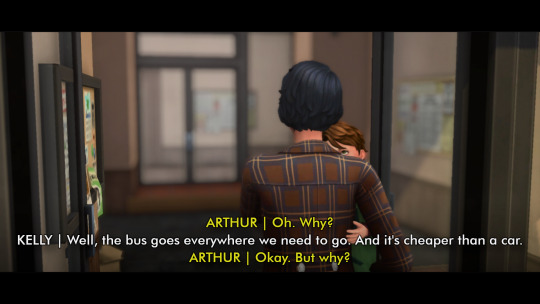


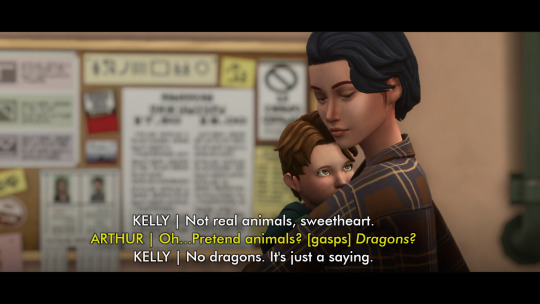


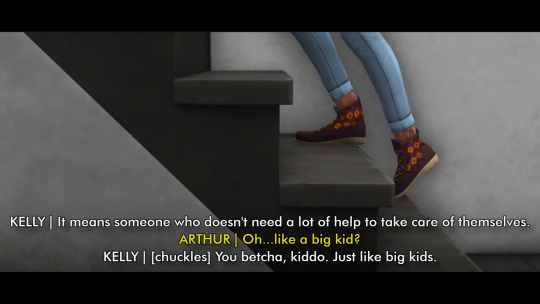

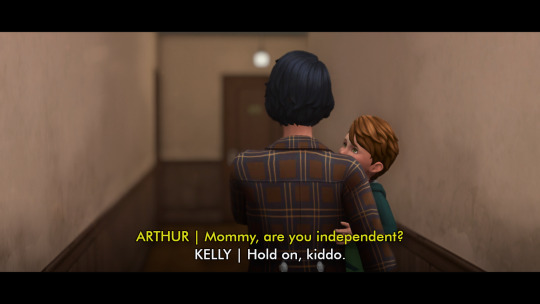

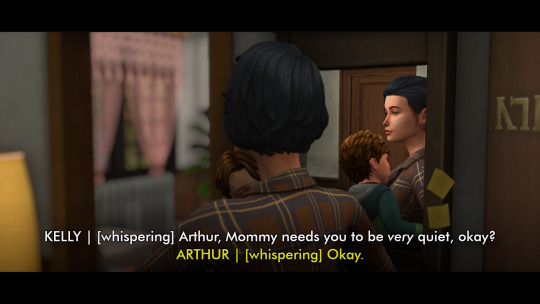
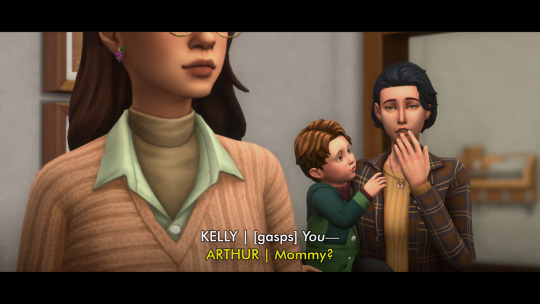


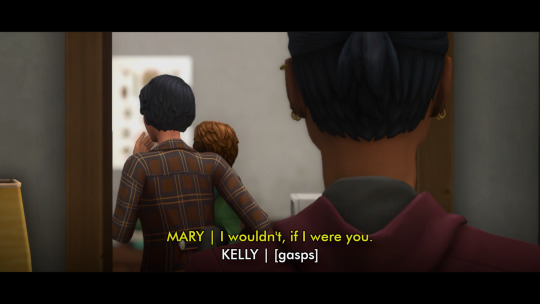



Previous | Chapter Start | Beginning | Summary
author's note: thank you to @nexility-sims for being my toddler dialogue consultant on this one. Arthur's probably still too articulate for a little guy, but that's fine. He's just really, really advanced for his age.
Toulon and Aducia remain the setting of @ardeney-sims' story, which does not actually exist. shh, it's a secret.
Transcript under the cut.
Pineview Manor // Toulon, Aducia
ARTHUR | Mommy? For my birthday, can I ride in a car? KELLY | Uh...we don't have a car, kiddo. ARTHUR | Oh. Why? KELLY | Well, the bus goes everywhere we need to go. And it's cheaper than a car. ARTHUR | Okay. But why? KELLY | Well, with a car, you have to pay for gas and insurance. And that's expensive. ARTHUR | Oh. What does eg...eg...egspensive mean? KELLY | [sighs] You are full of questions today, aren't ya? KELLY | Ugh! Who just leaves their boxes all over? Animals, I swear to god... ARTHUR | What kind of animals, Mommy? KELLY | Not real animals, sweetheart. ARTHUR | Oh...Pretend animals? [gasps] Dragons? KELLY | No dragons. It's just a saying. ARTHUR | Mommy, what's your favorite animal? KELLY | Hm...cats, I think. ARTHUR | Why? KELLY | They're cute. I like their little whiskers. And I like how they're independent. ARTHUR | What does independent mean? KELLY | It means someone who doesn't need a lot of help to take care of themselves. ARTHUR | Oh...like a big kid? KELLY | [chuckles] You betcha, kiddo. Just like a big kid. ARTHUR | Mommy, am I a big kid? KELLY | Mhm. And you're getting bigger every day. ARTHUR | Mommy, are you independent? KELLY | Hold on, kiddo. ARTHUR | Why? KELLY | The front door is standing wide open... KELLY | [whispering] Arthur, Mommy needs you to be very quiet, okay? ARTHUR | [whispering] Okay. KELLY | [gasps] You- ARTHUR | Mommy? ROSALIND | Me. ARTHUR | [whispering] Who's that lady? KELLY | I don't know how you tracked us down, but come near us. If you try anything, I'll...I'll...I'll scream! MARY | I wouldn't, if I were you. KELLY | [gasps] KELLY | You were the one who broke into my apartment! MARY | Sorry. We needed a sample for the DNA test. You understand. ARTHUR | [whispering] Mommy, what's DNA? KELLY | I never asked for anything from any of you! Why can't you leave us alone? ROSALIND | Kelly, please. That's quite enough. ROSALIND | Why don't you come in and have a seat. We have business to discuss....
#armorica story#chapter 3#behind the scenes#character: kelly farrier#character: arthur farrier#character: rosalind st. fleur#character: mary yokoyama
57 notes
·
View notes
Note
for absolutely strictly state security reasons the citizens of paris would love to know the deal with that corsican officer friend of citizen robespierre's younger brother.
I asked Citizen Robespierre (who is out of work today, or he would have answered this himself) and here's what I got: the officer's name is Citizen Bonaparte, and he's a brigadier general who's been going back and forth between here and Toulon, where the troops seem to be making good progress recapturing it from the British. He and Citizen Augustin Robespierre have apparently become quite friendly while on campaigns together.
I've only seen him in person a few times, and he seems decent and competent enough. There's something about him that unsettles me, though I'm not sure why. Somehow he makes me feel anxious, if there's something dark and hungry lurking beneath the surface of his gaze. But everyone else seems to like him fine, so it's probably just me being a bit on edge.
#committee inquiries#french revolution#frev#frevblr#augustin robespierre#napoleon bonaparte#unreality#gimmick blog
35 notes
·
View notes
Note
“because he never accepts that it's never been about righteousness--it's about repentance.” except javert killing himself IS repentance.
well, it’s like 12 different things, because bro had gone days without sleeping and very little food and water and he already had low self-worth and kept asking the amis to kill him and just assumed he was going to die AND THEN valjean upended his understanding of the world and morality. he was really going through it & there are a lot of overlapping reasons for why he jumps into the seine.
but javert is like Number One Most Responsible guy in the whole story. taking responsibility is his Thing (forever bitter the musical doesn’t include the punish me monsieur le maire scene). how else, in his derailment, could he atone for his conceived misdeeds other than by handing in his resignation to god? in the brick he had already left a note urging his superiors to treat convicts at toulon better, which is another step in his repentance (and another crime the musical commits by not including it). jumping into the seine was another step.
honestly a lot of ppl who like the book think the musical was dead wrong to exclude him from the big heaven group sing, because it COMPLETELY undermines the themes of forgiveness and compassion threaded throughout les mis. like the musical was simply wrong lol.
This is helpful context! I am still finishing the brick, although I have fully read the abridged version, and that detail about the letter wasn't included, so I didn't know that occurred! (And thank you for the message--this is a long response but I'd love to hear more of your thoughts!)
I agree that Javert is certainly deeply distraught and remorseful; like you mentioned, his worldview is literally falling apart, and his actions reflect his mental state. But his death isn't really repentance--in the sense that it's not what God would have wanted. To me it reads like a Judas situation: a desperate realization of a huge mistake, and doing the only thing you think can make it right, namely, ending it all. That's the just punishment for someone so wrong, isn't it?
But true repentance, meaning the repentance that the Lord desires, is about changing your ways, not "paying a price." Had Javert really understood the beauty of Valjean's mercy (an image of Christ's, just as the bishop's undeserved mercy was to Valjean himself), rather than killing himself, he would have lived to also become "an honest man"--in heart. One who could forgive and understand forgiveness, for himself as well as others. One who could recognize that he is not The Law, that he can fall, but that he can also be "brought to the light." One who could accept that men like Valjean, and men like himself, CAN change, and be changed.
It's tragic to me because so much of "Stars," and his character in the book as well as the musical, is about wanting to be righteous, to rise above his birth and the sinfulness he associates it with. It's about wanting to please the Lord by his actions. But in his end, he shows he never understood what God really wanted from him, and that's where my original phrase comes in: not righteousness, but repentance. To live, and face the man you were, knowing it's no longer the man you are. That it's never been about what you've done or can do, but about what's been done for you. That's the Gospel that he could never fully accept.
To use another example you mentioned, that misunderstanding drives why he asks the Mayor (Valjean) to punish him--in his worldview, mercy is unjust, or at the very least, unfair. Evil must be punished; "those who fall like Lucifer fell" receive "the sword." But "as it is written," God "desires mercy, not sacrifice" (Matthew 9:13). God would have wanted Javert to live, and Javert couldn't see that, and that's why it's devastating to me. In his misunderstanding of the heart of God, he misses what would have set him free from the chains of sin he's always been trying to escape.
That's why he's contrasted with Valjean, who (though he carries guilt about his past till the end of his life) is eventually able to face it and confess what he had done to those he loves. He knew there was mercy to be found, if only it was asked for. Javert was too blinded by pride and shame to realize it, and so, while broken, he never was able to truly repent.
For that, you must go on.
#i have a lot more thoughts on this specifically as it relates to pride as javert's fatal flaw. that's what kept him from grasping it all#because fundamentally he believes what he does is what sets him apart as righteous. that's the symbolism of the brand: your deeds define you#so if it's actually been about mercy all along then he has been needlessly cruel when he thought it was righteousness#and all of his actions that he thought made him better have been for nothing. he's carried shame for nothing. been a slave for nothing#les miserables#les mis#inspector javert#responses aka the ramblings of my brain#my meta posts#meta#kay can i just catch my breath for a second#no actually i'm still not done just needed to interrupt for the search tags etc.#shame is only possible where pride is present#that's my hot take. if javert had been truly totally humble he would not have killed himself. he would have accepted the gift of life#which is the same gift we are given in christ!! and that's honestly why it isn't repentance because the whole thing is a christian allegory#his suicide shows that he still regards himself as judge. he determines the punishment#and in his song the lyrics are full of things like 'damned if i'll live in the debt of a thief' 'i'll spit his pity right back in his face'#he is too prideful to accept the gift that christ has given: salvation UTTERLY unearned and undeserved. through grace alone#narratively he represents the Law (old covenant) in christianity and those who still choose to live under it#romans 3:20 says 'therefore by the deeds of the law shall no flesh be justified in His sight: for by the law is the knowledge of sin'#but valjean represents one saved by the new covenant. who can see that his 'righteousness is as filthy rags' (isaiah 64:6) and is redeemed#and that is why ultimately from a narrative perspective valjean has salvation and javert does not#not that javert did not see his wrongdoing but that he could not look past his own 'righteousness'#anyway this was all very christian-info-dump but the book is too so i feel it was justified 😂 but that's my interpretation#would love to hear more thoughts if you have them!! i truly hope this didn't come off as combative bc i mean it super genuinely!#kay has a party in the tags#kay is a musical theater nerd#kay is a classical literature nerd
14 notes
·
View notes
Note
Bad things that robespierre did.
(I don't know why i don't feel safe by asking this question--)
Well, if we’re gonna speak in those terms, some things off the top of my head go as follows below. I don’t know if everyone on here would consider all of them fully ”bad” given the circumstances, so maybe a better way to see it is as ”ways Robespierre was involved in the period afterwards dubbed ”the terror” that are not all as known.”
On May 26, Robespierre, after having refused to for several months, openly called for an insurrection against deputies of the National Convention at the Jacobins — ”[…] the people must rebel. This moment has arrived. […] I invite the people to join the National Convention in insurrection against all the corrupt deputies.” Three days later, on May 29, he repeated this wish — ”I say that if the people do not rise in their entirety, liberty is lost.” Two days after that, the Insurrection of May 31 took place, with armed sans-culotte storming the Convention and obtaining the arrest of 29 Girondins. I find it hard to believe Robespierre’s words didn’t play a decesive roll for the insurrection to happen when it did.
Robespierre also had a hand in the creation of Desmoulins’ pampleth Histoire des Brissotins (May 1793), which is another piece essential in the fall of the Girondins. This is proven through the following passage from Lettre de Camille Desmoulins, député de Paris à la Convention, au général Dillon en prison aux Madelonettes (1793): ”The true origin of the rigor of the Committee towards you, would it be in a very long note, which was printed following l’Histoire des Brissotins, which Robespierre made me cut out?”
On October 29 1793, when the trial of the Girondins had been dragging on for five days, Robespierre proposed that ”If it happens that the judgment of a case brought before the revolutionary tribunal has lasted for more than three days, the president will open the next session by asking the juror if their conscience is sufficiently enlightened. If the juror answers yes, judgment will proceed immediately.” The motion was passed and became essential in getting the 22 Girondins condemned to death the following day. How many others fell victim to it afterwards I don’t know.
Robespierre also played an important role in the condemnation of the dantonists, who also got a not so very fair trial before being driven to the scaffold. I’ve already written about the different ways he was involved here.
Robespierre personally wrote to several representatives on mission and encouraged them to be bold when punishing counter revolutionaries in the departments. I don’t think such words coming from someone as influencial should be considered insignificant when measuring the repression that was later carried out there:
The National Convention, citoyens collegues, witnessed with pleasure your entry into Lyon. But its joy could not be complete when it saw that you at the first movements yielded to a sensibility way too unpolitical. You seemed to abandon themselves to a people who flatter the victors, and the manner in which you speak of such a large number of traitors, of the punishment of a very few and the departure of almost all, have alarmed the patriots who are indignant at seeing so many scoundrels escaping through a gap and going to Lozère and mainly Toulon. We therefore won’t congratulate you on your successes before you have fulfilled all that you owe to your country. Republics are demanding; there is national recognition only for those who fully deserve it. We send you the decree that the Convention issued this morning on the report of the Committee (this decreee, which contains the infamous phrase ”the city of Lyon shall be destroyed” — a slogan which Robespierre himself had come up with). It has proportioned the vigor of its measures to your first reports. It will never remain below what the Republic and freedom expect. Beware above all of the perfidious policy of the Muscadins and the hypocritical Federalists, who raise the standard of the Republic when it is ready to punish them, and who continue to conspire against it when the danger has passed. It was that of the Bordelais, of the Marseillais, of all the counter-revolutionaries of the South. This is the most dangerous stumbling block of our freedom. The first duty of the representatives of the people is to discover it and avoid it. We must unmask the traitors and strike them without pity. These principles alone, adopted by the National Convention, can save the country. These principals are also yours; follow them; listen only to your own energy, and carry out with inexorable severity the salutary decrees which we address to you. CPS decree to the representatives in the newly entered Lyon, written by Robespierre on October 12.
PS — Punish severely and promptly the traitors and royalists, especially the leaders and principal agents of Girondin and counter-revolutionary intrigues. Beware of the marks of patriotism with which they cover themselves, following the example of the traitors of the Convention, who are their models. Only by purging the den of counter-revolution and hypocrisy can you spare the Republic the new disasters with which it is always threatened in the South. Robespierre in a post-scriptum note added to a CPS decree to representatives in Bordeaux written by Billaud-Varennes (in other words something he really wanted to underline for the representatives)
The representatives of the people near the army of Italy and the department of Bouches-du-Rhône are in charge of these measures: they will have the leaders of the royalist and federalist faction severely punished. CPS decree regarding Marseilles written by Robespierre on November 4 1793
These fears for the suffering public good, which made me decide to come here (Lyon) on your (ton) invitation, were not in vain. Letter from Collot d’Herbois to Robespierre dated November 3 1793. A sign Robespierre played a decisive role in sending Collot to punish Lyon.
Like I wrote in this post, Robespierre and his collegues at the CPS and the Convention were aware of the wholesale repression carried out by representatives on mission like Fouché and Carrier without seemingly trying to do anything about it (so I suppose they accepted what they heard). In fact, none of the decrees recalling the representatives hint that the amount of executions carried out under their stay is the reason for it.
If Robespierre’s role in writing the Law of 22 Prairial is more dubious than what a few historians would have us believe (the only person who’s involvement in the development of the law can truly be established is Couthon) he was nevertheless the author behind the decree for the Commission of Orange on May 10 1794 (1, 2), a decree that has been accepted as the precursor of the aforementioned law. Like the law of 22 Prairial, the decree made it the duty for the commission to punish ”the enemies of the people,” which it defined as ”all those who, by any means whatsoever and with any deeds they may have covered themselves, have sought to thwart the march of the revolution and to prevent the strengthening of the Republic.” The punishment for this crime was always death, and the proof necessary for condemnation ”is all information, of whatever nature, which can convince a reasonable man and friend of liberty.” Within 47 days, the commission pronounced 332 death sentences, 116 prison sentences and 147 acquittals.
In April 1794 was introduced a police bureau subortinate to the CPS (Bureau de surveillance administrative et de police générale). It would appear it was meant to be run by mainly Saint-Just, but that Robespierre took it over when he was away from the captal. Due to Saint-Just’s frequent missions, Robespierre ended up being the actual head of the bureau during two of its three months existence (the notes for the bureau are in SJ’s hand from April 23-27, in both SJ and Robespierre’s on the 28th, only Robespierre between April 28-May 31, both on June 1, only Robespierre between June 2-29, both on June 30 and afterwards occasional reports made by either SJ or Couthon). Unfortunately, only one study exists over the bureau, made in 1930 by the historian Arne Ording. It has been digitalized by Internet Archive, but in super poor quality, so you end up having to rely more on what other historians say about it. Which isn’t that easy either because they all seem to lay out different numbers. According to Albert Mathiez (1930), Ording’s study found 464 decrees from the police bureau between April 24 to July 26 (and 1 814 from the Committee of General Security for the same period ) — 58 of which ordered liberations of prisoners and 250 were arrests. Annie Jourdan (2016) too writes that the bureau contained 464, of which 250 were arrests and 295 looked at officials. But she also adds that only a fifth of the judgments were acquittals, and that, instead of April 24, the bureau functioned between May 23 and July 28. According to George Lefebvre (1931), Ording only consulted 121 of the 464 decrees (out of which 55 were either written or co-signed by someone else than Robespierre, Saint-Just and Couthon), making you wonder how the two previous can be sure about what all the decrees contained… The same thing is claimed by J.M Thompson (1935) but he also adds that, ”out of 775 notes by Robespierre, Saint-Just, and Couthon, only 229 should be found ordering arrest, or reference to the Tribunal, or transference to Paris.” In other words, there would exist more notes than actual decrees… The bureau nevertheless makes Robespierre the CPS member to have signed the second biggest amount of decrees ordering arrests and or/transfers before the Revolutionary Tribunal during the period dubbed ”the great terror” (30, after Saint-Just’s 35, and yes, I have actually counted the arrests found in Recueil des actes du comité de salut public to come to this conclusion🤦🏼♀️) and this despite the fact that he was absent for about half of it. I also don’t think it’s impossible he was trying to make the Committee of General Security redundant with the help of the bureau, considering he does recommend making said committee subortinate to the CPS in his last speech.
On June 7 1794, a letter signed by Robespierre and Barère ordered Hermann — the chairholder of the Commission of Civil Administration, Tribunals and Prisons and put in first place on a list of patriots with ”more or less talent” written by Robespierre — to investigate if there were plans for a breakout in the Bicêtre prison after having received a warning from one of its inhabitants. Six days later, a CPS decree signed by Robespierre and seven of his collegues ordered 15 inhabitants from said prison to be transferred to the Conciergerie in order for them to come before the Revolutionary Tribunal as soon as possible. It further ordered Hermann to send to the tribunal all other Bicêtre prisoners suspected of being part of the same complot. Ten days after that, on June 23, Hermann sent Robespierre a letter in which he suggested applying this procedure to all the prisons of Paris, in order to ”purge the prisons at a stroke and to clear the soil of freedom from these dregs and rejects of humanity.” Robespierre sent the letter back with both his signature and the word approved written on it, together with the counter signatures of Barère and Billaud-Varennes. Two days later on June 25, the CPS confirmed their decision when writing a decree charging Hermann’s Commission of Civil Administration, Tribunals and Prisons ”to search in the various prisons of Paris for those who have been particularly involved in the various factions, in the various conspiracies that the National Convention has destroyed, and whose chefs it has punished, those who in the prisons were trustees and agents of these conspiratorial factions, and who were to be the actors of the scenes so often projected for the massacre of the patriots and the ruin of freedom to make it her own. The charge, moreover, of taking, in concert with the administration of the police, all means of establishing order in the prisons.” The decree bears Robespierre’s signature, along with those of ten of his collegues. Finally, on July 5, a CPS decree written by Barère and signed by him, Robespierre and seven others ordered the same commission ”to make a daily report on the conduct of the prisoners in the various prisons of Paris, and the Revolutionary Tribunal to judge within 24 hours those who have attempted revolt or excited closure.” This was the solution to the so called ”prison conspiracies,” in which on several days, prisoners were brought before the tribunal in big groups to be met with flimsy evidence against them, and where aquittals mostly numbered between about 0-3. In total, 363 people were executed (37 people on June 16, 36 on June 26 (the Bicêtre prison), 60 on July 7, 48 on July 9, 38 on July 10, 25 on July 22 (the Luxembourg prison), 46 on July 23 (the Carmes prison), 25 on July 24, 25 on July 25 and 23 on July 26 (the Saint-Lazare prison)) — about 27% of the 1366 official victims of ”the great terror.” Not only that, but among those executed can be found three 16-year-olds, the youngest people to ever have been executed by the Paris Revolutionary Tribunal. As can be seen from the decrees, Robespierre is certainly not the only one who bears responsibility for these executions (the direct orders to immediately send prisoners from the Luxembourg (signed Saint-Just on July 5) and Carmes prison (signed Saint-Just, Carnot, Prieur, Billaud-Varennes, Couthon and Collot d’Herbois on July 20) before the tribunal would for example appear to not have been made by him), but given his closeness to Hermann and the fact he, along with Barère, is the only one to have signed all of them, certainly shows he’s not blameless for what went down. According to J.M Thompson, the prison reports also built on facts reported by the above mentioned police bureau, which, according to him, makes Robespierre bear a double responsibility.
On August 15 1792, Robespierre was the first person to suggest creating a Revolutionary Tribunal, a wish that was fulfilled two days later (1, 2).
92 notes
·
View notes
Text
You Are In Love

A/N Hello this is my first writing that I posted so I would love constructive criticism. I hope you enjoy it though!! This doesn't follow the plot exactly of the OBX but there are some season 3 spoilers! I also did not have time to proof read so let me know any spelling errors. Thank You!!
One look, dark room
Meant just for you
People always said you and JJ were speaking to each other without words. There were times that they weren't needed like when you are uncomfortable with a Toulon at the boneyard or he comes crawling in your window after a fight with his father. No words were exchanged but the look was enough. You would both sink into each other and just know.
Time moved too fast
You play it back
Every minute spent with JJ was too fast. One minute you would be on the beach sunrise really to surf and the next it was night at the Chateau with the Pogues. You played the memories over and over until they were worn out. You didn't realize how often your life with the Pogues were centered around JJ.
Buttons on a coat
Light-hearted joke
The first time he gave you his coat was because you were freezing at a party. JJ made the joke that if he gave it to you, you would never take it off and he would never want you to take it off. It would fit you too well. He finished up the zipper and the joke resonated deep within you both. You never did end up giving the coat back.
No proof, not much
But you saw enough
That was the first second you saw what everyone else did. The lingering look you both shared in that moment was enough to make you think that maybe you two were enough for each other but it wasn't enough for you to vocalize it to JJ.
Small talk, he drives
Coffee at midnight
JJ was notorious for not having money but whenever he did he almost always spent it on you (and weed), no matter what. Driving to desolate locations on his bike. Buying you 7$ coffees, all while bitching it is cheaper to make it at home. You two always talked about your fears after the drives and somehow JJ made you forget every single one.
The light reflects
The Chain on your neck
The first gift you got JJ was when you were 14, it was a silver plated chain with his initials on it. You told him that you wanted to put your initials on it but you didn't own him. Whether he was surfing, riding, treasure hunting or getting hammered, he had it on. When John B finally asked why he never took it off, even when he showered, JJ simply said "That way she never leaves me"
He says "Look up"
And your shoulders brush
You lived for these moments when it was just you and JJ. When the lightest of touches came to you. He doesn't realize you are waiting for them. They are not only cause an inferno to burn with you but they also cause every thought and worry turn into a constant thrum of "JJ Maybank." To you stargazing means peace of mind. To JJ it means he can stare at you without getting caught.
No proof, one touch
But you felt enough
You never felt perfect in the presence of anyone but when you met the whirlwind, chaotic, and maybe at sometimes scatterbrained JJ Maybanks you knew he made you feel enough.
You can hear it in the silence, silence, you
You can feel it on the way home, way home, you
You can see it with the lights out, lights
You are in love, true love
You are in love
Morning, his place
Burnt toast, Sunday
JJ considered the Chateau his home until Luke hightailed it out of the OBX and then all of a sudden you were at his childhood home four nights a week. The mornings were his favorites. He rolled over or looked down depending on how much you two intertwined in your sleep (which he always waited until you were asleep then pulled you to him but he always said you were the one who moved closer) and then he would find the strength to get out of bed and try to make you breakfast. It always ended with something getting burnt, usually the toast but sometimes other things.
You keep his shirt
He keeps his word
JJ would watch as you laughed and try to clean up his mess. His shirt over your body. John B and Pope would make fun of him for the rest of his life if they saw the gentle look in his eyes. He promised to himself and you that he would never let anything hurt you so after the bacon grease started splattering you he jumped up, screaming "BACK you devilish bacon lard. you shall not hurt the princess rogue" as he swings you behind him and holds the spatula as a sword.
And for once, you let go
Of your fears and your ghosts
JJ knows. He sees the distant look in your eyes when he gets close. He know the thoughts in your head. He has the same ones about worth and values. JJ has known you since the 4th grade and SEES you. He knows you itch your palm when you are nervous and when you are consumed with the thoughts in your head, your hand finds his rings and starts spinning it around and around.
One step, not much
But it said enough
JJ hates dancing but at the boneyard with you beckoning him with your fingers and lip syncing a trash song he couldn't help but start walking towards you. He is standing at a reasonable distance and then takes a chance. Takes a step closer. You stop singing. You stop breathing. He knows this is the make it or break it moment. JJ stops the "You fucked up" thought from entering. And waits. Your eyes light up and the radiance you emit is blinding. You start dancing and singing again but only after wrapping your arms around his neck and placing a kiss on his cheek.
You kiss on sidewalks
You kiss for the first time that night as he is taking you into his house. Nothing beats this and yet everything else has been building up to this moment. Maybe his whole life has been waiting for this.
You fight and talk
JJ is crying. Fighting is something he hates but fighting with you is worse. You see his point of view more than anyone else so maybe that is why it hurt so much more when you told him he was being irrational. Before he knew it he was yelling and you looked scared. He did grab your hand and he did apologize but you looked scared. He didn't mean to yell. JJ begged to talk and you were pleased to see him come back from his rage. You sat him down and talked for an hour about his reasoning and somehow you met in the middle. JJ was crying because he never knew it could be this way.
One night he wakes
Strange look on his face
You are used to JJ waking up in the middle of the night whether it is from you moving too much, getting too hot, or the least favorite of your reasons, a nightmare. This one was strange. He looked like he hadn't slept at all but looked so energized that anyone would think he slept for five years. You finally ask "JJ, you good?"
Pauses, then says
You're my best friend
There is a reason that JJ didn't know life could be like this. There is a reason he didn't know you could talk issues out, or wake up and feel happy, or even look over at someone in the car who has no makeup on, covered in dirt and sweat, with the wind blowing in her hair and think she is ethereal.
And you knew what it was
He is in love
JJ didn't know it could be like this cause he was never in love. Or maybe he was this whole time and just din't have the name of the feeling he felt for you
You can hear it in the silence, silence, you
You can feel it on the way home, way home, you
You can see it when the lights out, lights out
You are in love, true love
And so it goes
You two are dancing in a snow globe, 'round and 'round
When you and JJ finally were able to go on a trip (thanks to good old Eldorado) he took you to do something he knew you always wanted to. He took you to a cabin in the middle of nowhere, alll while complaining about the drive. He bought warm clothes cause he would be damned if you got sick and when it started snowing outside of the cabin he took you out and danced until your feet were sore and both your hands and nose were numb with the cold.
And he keeps the picture of you in his office downtown
Once the surf shop was up and running the first thing JJ did was put a picture of you and him holding boards on OBX beach. To tourists this looked like good marketing. To all the other the Pogues they knew no matter where JJ was, whether it was at work or home, HE had to keep you in his eyesights.
And you understand now why they lost their minds and fought the wars
And why I've spent my who life tryin' to put it into words
With his first paycheck from the surf shop he got you a gift. A silver plated necklace with your name on it. You opened it and took it out with a soft smile on your face. "You got me a matching one." JJ reached around and took his off and took yours out of your hands. He then proceeded to put the necklace with your name on and reached around your neck to put the necklace with his name on your neck. You were staring at him startled because the thought of JJ making an official claim to someone still rattled your brain.
"You know I never got why people said they lost their minds to love, but I get it. I think I lose mine everyday when I see how perfect you are when you sleep, or make breakfast, or read. I think I lose it every time I walk out the door or you walk out it. There is not a single part of me that hasn't been crazy before. But you. You make me insane. You are the one thing I got right you know? I don't need anything else. Cause you own me and I own some piece of you. And I wouldn't change it for all the buried treasure in the world."
Cause you can hear it in the silence
You can feel it on the way home
You can see it with the lights out
You are in love, true love
You are in love
#obx fic#obx jj maybank#obx cast#jj maybank#outer banks#jj mayback x reader#jj mayback imagine#outer banks pogues#the pogues#p4l
123 notes
·
View notes
Text
It’s been a while since I’ve done some Gourgaudposting. Here is his entry from 18 September 1817, featuring Napoleon’s commentary on Junot, which shares some noticeable parallels to Napoleon’s St Helena rants about Murat—he committed nothing but sottises (follies/stupidities), he was a womanizer, he never should’ve been promoted so high etc.
***
Thursday, 18 (September 1817) – At 5 o’clock, the Emperor pays a visit to Mme de Montholon. The colonel of the 12th Regiment, arriving to the island from France, goes to Bertrand’s, asks to be received, but His Majesty responds that he is indisposed.
After my dinner, His Majesty summons me, treats me well, and speaks to me of the Russian campaign. “At Ostrowo and Witebsk, I managed to cut the Russian army off from the road to Petersburg. At Smolensk, Junot committed nothing but follies, as well as at Valoutina; I sent you there. It was you who came to tell me he could cut off the Russian rearguard, but that he couldn’t decide to go ahead with it. You asked him: Monsieur le Duc, if the Emperor inquires why you have not marched, how should I answer him? He replied in an embarrassed tone: ‘You say that night has come and that I’ve taken position.’ So, I dismissed him at night.” – “In the morning, Your Majesty, on horseback, sent General Denorval to prevent me from waking up, because I was tired. This surprised everyone, and they thought my fortune had been made.”
The Emperor, after a moment of silence, resumed the conversation: “I met Junot at the siege of Toulon. He was quartermaster in a battalion of the Côte-d’Or; I needed writers, I had requested one from Gavais, commandant at Fontainebleau in 1814, who was then at the head of this battalion. He sent me two of them. Junot arrived first, I took him, he pleased me. Being, the same day, in my battery, I had him write a letter; a cannonball covered us with earth, and he exclaimed: Good, there’s the ash for the letter! He had a superb hand, and he remained with me. The other quartermaster was, a long time afterwards, still a noncommissioned officer, while Junot had a great advancement. Such is fate. Junot has never been anything but a swashbuckler, a ferocious philanderer. He loved to surround himself with nobles. I never should have given him command; in the last days, he wanted to be marshal. At Valoutina, he was already insane.”
His Majesty critiques the book attributed to him.
***
Source: General Gourgaud, Sainte-Hélène - journal inedit de 1815 à 1818.
60 notes
·
View notes
Text
Junot crying for Napoléon in Montbard
This excerpt is from the Narrator’s POV . He was visiting Junot shortly after he was sent back home to “recuperate”. Narrator's name is Pierre.. based on the Monsieur Vial i assume.
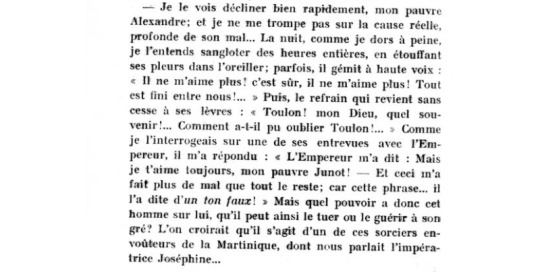
— I see him decline too quickly my poor Alexandre*, and I am not wrong on the real cause of his unhappiness... At night I barely sleep i hear him sobbing during hours muffling his cries on his pillow. Sometimes he says « He doesn't love me anymore ! Its certain he doesn't love me anymore ! Everything is over between us! ... » « Toulon! my god, what a memory ! ... How could he forget Toulon! ...» I asked him about one of his meeting with the emperor, he told me : « The emperor told me : but I still love you my poor Junot ! » and this break me more than anything , because this sentence ....he told this in such a fake tone! » But what power have this man on him , he can kill or heal as he likes? It was like one of those wizards in Martinique that the empress Joséphine told us about.... *Alexandre was also a name Junot used
just a few pages after this, the author continues to write that due to Junot's deteriorating mental state, he had "believed himself to be the wife of Bonaparte" and says to Pierre "He loves me no more, because I am no longer beautiful…"

i skipped through the part about Albert de Permon being annoyed at his behaviour but seeing that nothing can console Junot, Pierre basically plays along and tells him:
— Patience, your husband will be back soon.
Junot proceeds to ask if there had been a courier from the Emperor yet but the answer is always no. This is one S-tier fic :)) reminder this was written way back in 1926 Naps is the top confirmed /jk
~~
In real life , i believe Junot has indeed uttered the line "He doesn't love me anymore" but in different variations. It’s a possibility that this line isn't completely fiction
in Laure's memoirs, Duroc had to yell to convince Junot that Naps still loves him after Russia:

in the book Wellington Against Junot by David Buttery he also mentions this anecdote:

*sobbing* see you guys in my next napjuno post🥲
#screaming crying throwing up#napjuno#jean andoche junot#napoleon#napoleon bonaparte#junot get a grip😭#thx to my friend laurent w/ some direct transl. help#naps had the power to make or break him#and he chose the latter :)))
82 notes
·
View notes